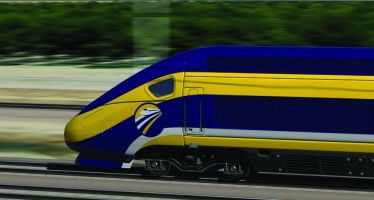High speed rail slows down
APRIL 30, 2010
Is it possible that the push for high speed rail in California could be slowing down? Recent economic troubles notwithstanding, it seemed that everyone, from the lowly citizen to the lowlier legislator, wanted a fleet of high-speed trains to shoot up and down the state at 200-plus miles per hour. Environmentalists, labor leaders and chambers of commerce all loved it.
But now the accountants and auditors are looking at the $40 billion to $60 billion project, and they don’t seem to like what they found.
“Although the [High-Speed Rail] Authority’s 2009 business plan contains the elements required by the Legislature, it lacks detail regarding how it proposes to finance the program,” states the new California State Auditor report “High-Speed Rail Authority: It Risks Delays or an Incomplete System Because of Inadequate Planning, Weak Oversight, and Lax Contract Management. “And brother, does it lack detail.
Reading the report, you get the idea that the same people who write the inflated hype about High-Speed Rail’s future service (“An environmentally-friendly transportation solution that makes perfect economic sense,” reads one brochure) also do the authority’s books. “The business plan provides little detail on how the Authority expects to obtain a total of $17 billion to $19 billion in federal grants,” the state auditor found, which also noted that high-speed rail in California has thus far only received $2.25 billion in federal money. “The program risks significant delays because the Authority’s plan depends almost exclusively on federal and state funds through 2014, and does not include specific steps for obtaining or replacing federal funds.”
How the authority intends to obtain the $10 billion to $12 billion in private funds it claims it needs is also in doubt. “The Authority’s Plans for Private Funding Are Vague,” reads one headline in the report. “Private investors have expressed interest in the program, but they have made no commitments and the Authority expects they will require a revenue guarantee to participate.” Guarantee or not, no one at the authority anticipates private rail money until 2015 at the earliest.
What’s more, the authority seems to be spending that money it does have in a free-wheeling kind of way: “The Authority has not consistently implemented its controls regarding paying contractor invoices and has not documented execution of some controls, risking that it will pay for work outside the scope of the program or for items not allowed by state rules.”
A possible for reason for that – indeed, all of the above – is that the nine-member authority board isn’t apparently exercising much authority. “We expected the Authority to be engaged in activities in a manner reflecting its legislative responsibilities and powers,” the auditor noted with some sarcasm. “However, the Authority’s involvement thus far has been limited.” One example: it still hasn’t appointed three members of an eight-member “peer review group” that will provide needed expert technical advice on high speed rail issues.
Though HSRA Chairman Curt Pringle found the report’s title “inflammatory” and “overly aggressive,” he had no problem with the auditor’s actual findings. “We believe the audit process has identified areas where the Authority can improve its administrative processes and project oversight,” he wrote in HSRA’s official response to the report.
A new state auditor report isn’t all Pringle and the rest of the High-Speed Rail Authority must contend with. There’s also AB 2121, introduced by Assemblywoman Diane Harkey, R-Dana Point.
Harkey introduced the bill in February. At first conceived as a way to defund the project of $10 billion in bonds approved in 2008, the bill has changed dramatically into one that now requires the High-Speed Rail Authority to provide detailed expenditure and financing plan to the Legislature.
“I have accepted the proposed amendments because they allow for an added level of accountability,” Harkey, a banker by trade, said in an April 20 release sent out after the bill unanimously passed out of the Assembly Transportation Committee. “This bill will ensure a higher level of scrutiny of the high speed rail project’s finances. What began as a $9.75 billion voter-approved bond has grown into a $40-$60 billion project. Clearly, we must have a realistic picture of the financial impacts on the state and the taxpayers of California.”
–Anthony Pignataro
Related Articles
SoCal support for bullet train wavers
California’s beleaguered high-speed rail project has hit yet another speed bump: a loss of confidence among Southern California officials already
I'm Not Flying!
John Seiler: Fortunately, California is such a beautiful state that there’s no reason to leave anyway, except to get a
GOP's Low Road On Immigration
APRIL 11, 2011 Republicans in the state Assembly, still high-fiving each other for stopping Jerry Brown’s one proposal that actually



